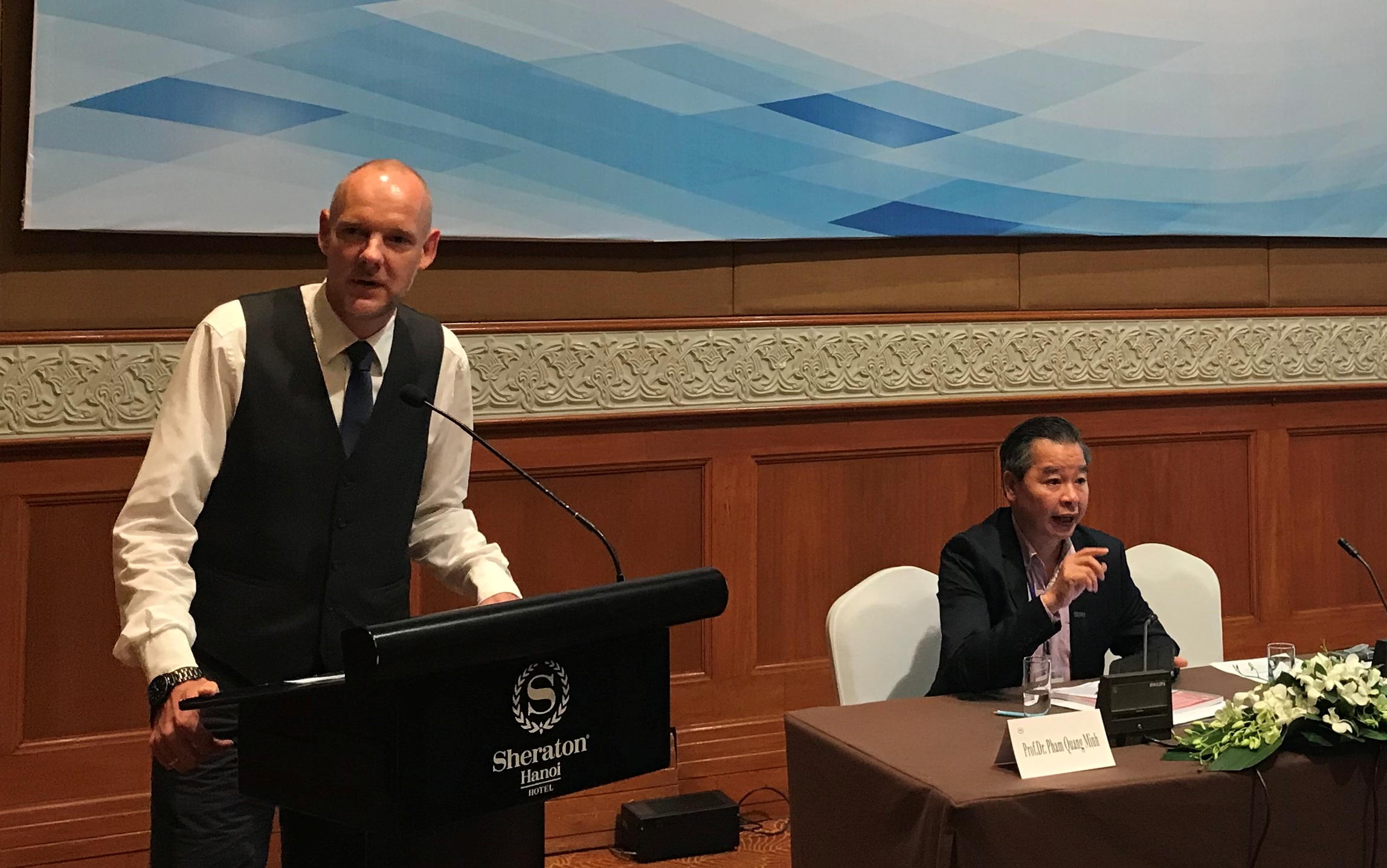
The workshop was attended by Mr. Peter Girke (Chief Representative of Konrad-Adenauer-Stiftung Foundation in Vietnam), Prof. Dr. Vu Minh Giang (Chairman of the Science and Training Council, VNU), Prof. Dr. Pham Quang Minh (Rector of the University of Social Sciences and Humanities) and many teachers and scientists in the field of History.
The seminar consisted of two sessions. Session I had the theme “Basic issues in innovating the compilation of history textbooks for high school level”. The theme of session II was “Innovation in compiling history textbooks for high school level: current situation in Vietnam and international experience”. The focus of the seminar was to discuss the limitations of current history teaching and learning and to propose reforms and innovations in compiling textbooks for high school level.
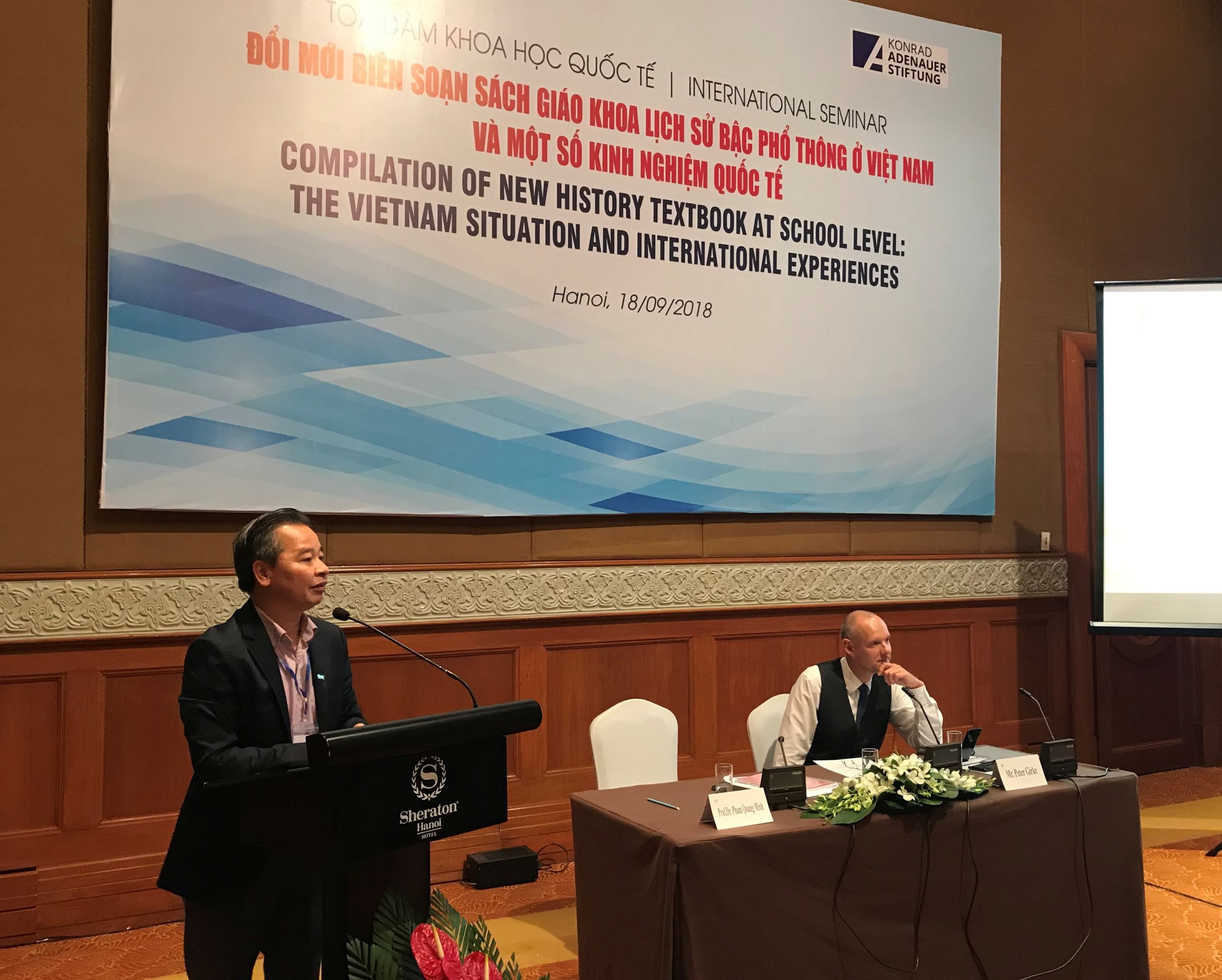
Principal Professor Pham Quang Minh delivered the opening speech of the seminar.
In his opening remarks, Prof. Dr. Vu Minh Giang stated the following: Vietnam is a country where history is the foundation of culture and tradition, so history plays a particularly important role. Therefore, the teaching and learning of History always receives the attention of public opinion in general and educators in particular.
Currently, there are many problems in teaching History in high school. That is, teaching History focuses too much on knowledge and memorization, making students bored. History textbooks are full of dry data. Teaching is only one-way interaction from teacher to student. Students feel like their views are imposed when learning...
Professor Dr. Vu Minh Giang believes that there is a need to innovate both in teaching thinking and in organizing the teaching of History. Because “we are entering a period where people can learn and access knowledge from many sources and in many different ways. School is no longer the only learning channel”.
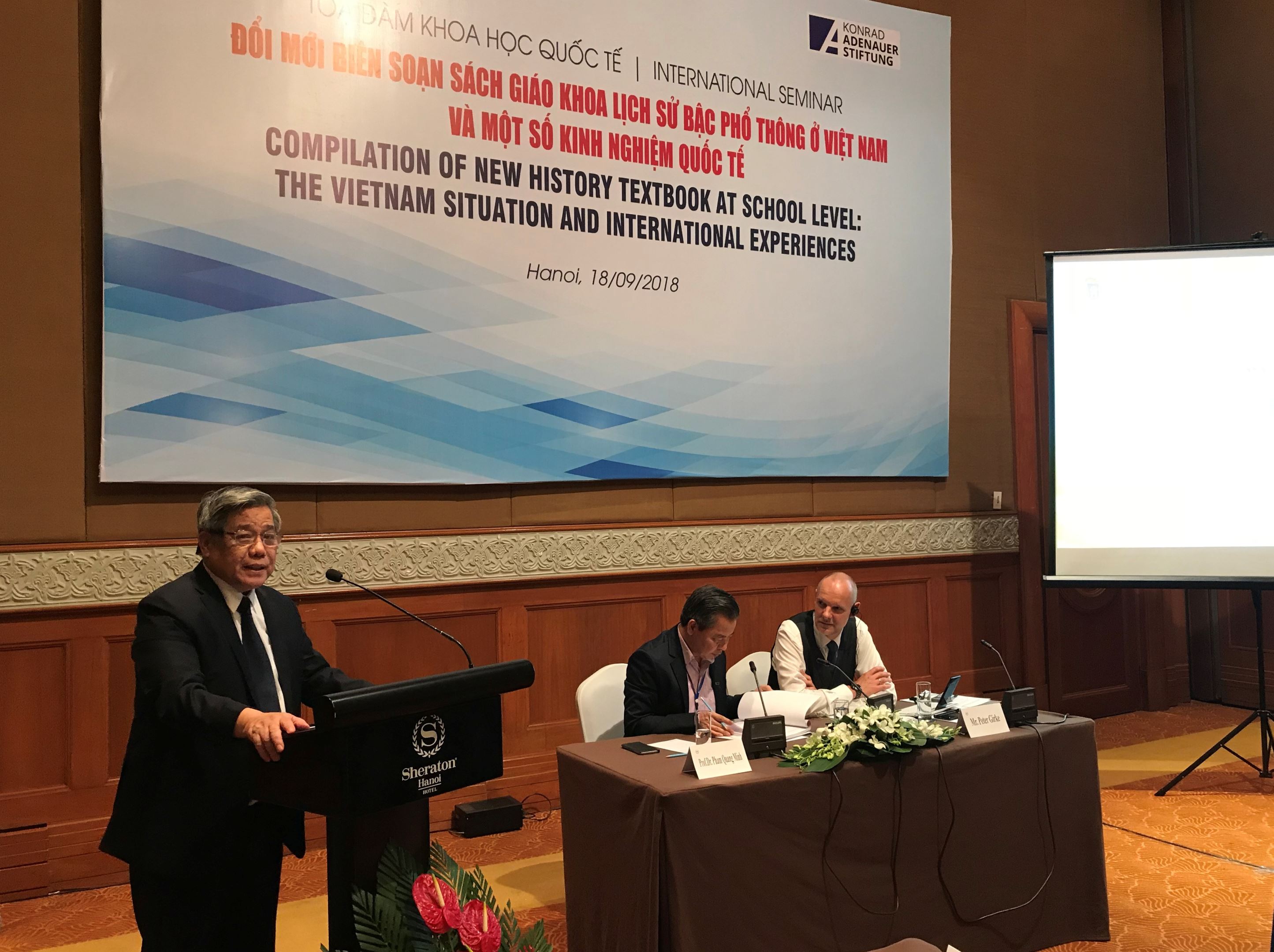
Prof. Dr. Vu Minh Giang delivered the opening speech of the discussion.
According to Prof. Dr. Vu Minh Giang, there are many points that need to be taken into account in the process of compiling general history textbooks. That is, it is necessary to strongly shift from approaching historical content and knowledge to approaching learning capacity. Textbooks must be compiled in a way that stimulates creativity and thinking capacity of students. The way of writing history textbooks must demonstrate that history is a science, with objectivity, not subjective and unchanging assessments. Or how much historical knowledge should be included in textbooks? How to make textbooks attractive and accessible to learners, from content, title to illustrations, presentation form...? Should IT elements be applied to build digital textbooks? How to make textbook content suitable for the diversity of development levels and perceptions of students in each region, so as to ensure universality without equalization?
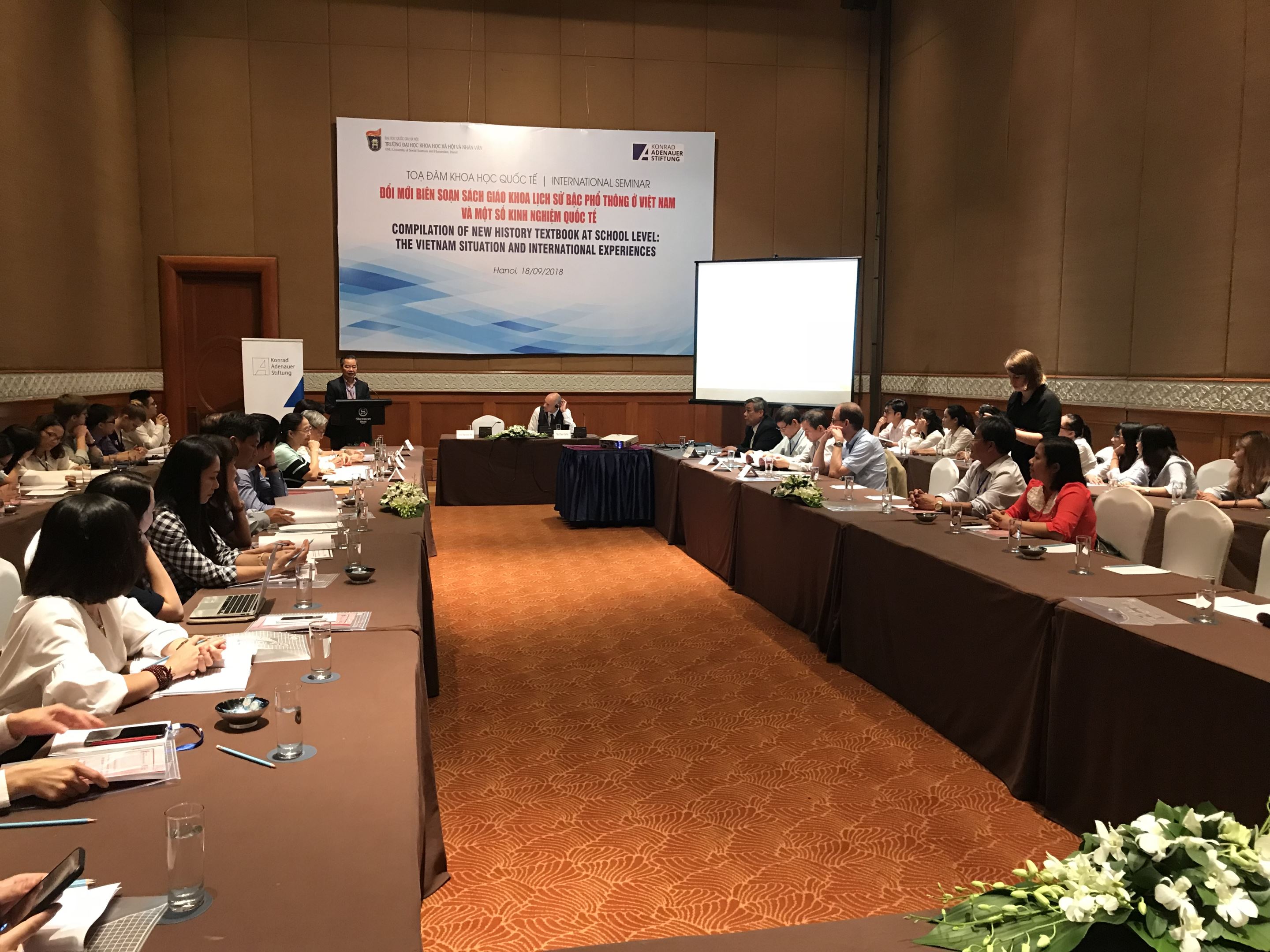
Sharing the opinion of Prof. Dr. Vu Minh Giang, Prof. People's Teacher Vu Duong Ninh (former Head of the Faculty of International Studies, University of Social Sciences and Humanities) also said that historical knowledge in current textbooks is still "heavy" on knowledge content. With the thought that textbooks are "laws", writers put all historical content and knowledge into books, teachers do not dare to teach differently from textbooks, students do not dare to learn anything other than textbooks. Thinking ability, ability to analyze, present, express opinions and defend one's point of view... are not encouraged and promoted at the high school level. In terms of form, History textbooks have few drawings, charts, and illustrations, but mainly text, so they are not attractive to learners.
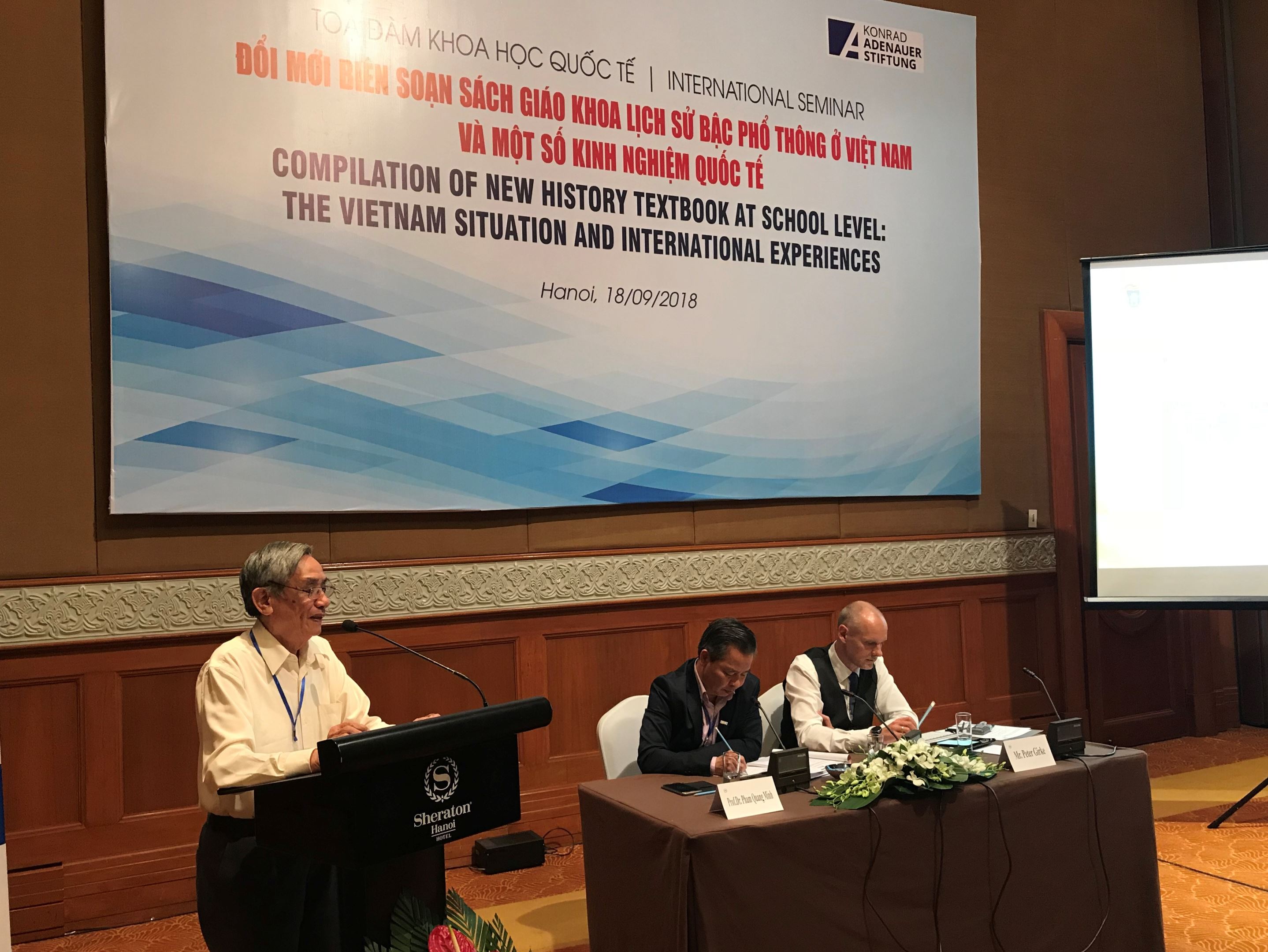
Professor, People's Teacher Vu Duong Ninh speaks at the seminar
Regarding the team of people participating in compiling textbooks, Professor Vu Duong Ninh affirmed that they are good professors with extensive and standard knowledge. However, when compiling books for students, sometimes teachers do not take into account the reception characteristics of this age group, so they "compress" inappropriate knowledge. Other factors such as understanding of information technology, how to apply and transform knowledge in many vivid forms of expression ... have not been given due attention.
Professor Vu Duong Ninh concluded 3 things to avoid when writing general education textbooks: avoid being greedy for knowledge, avoid long-winded presentations, and avoid imposing subjective opinions.
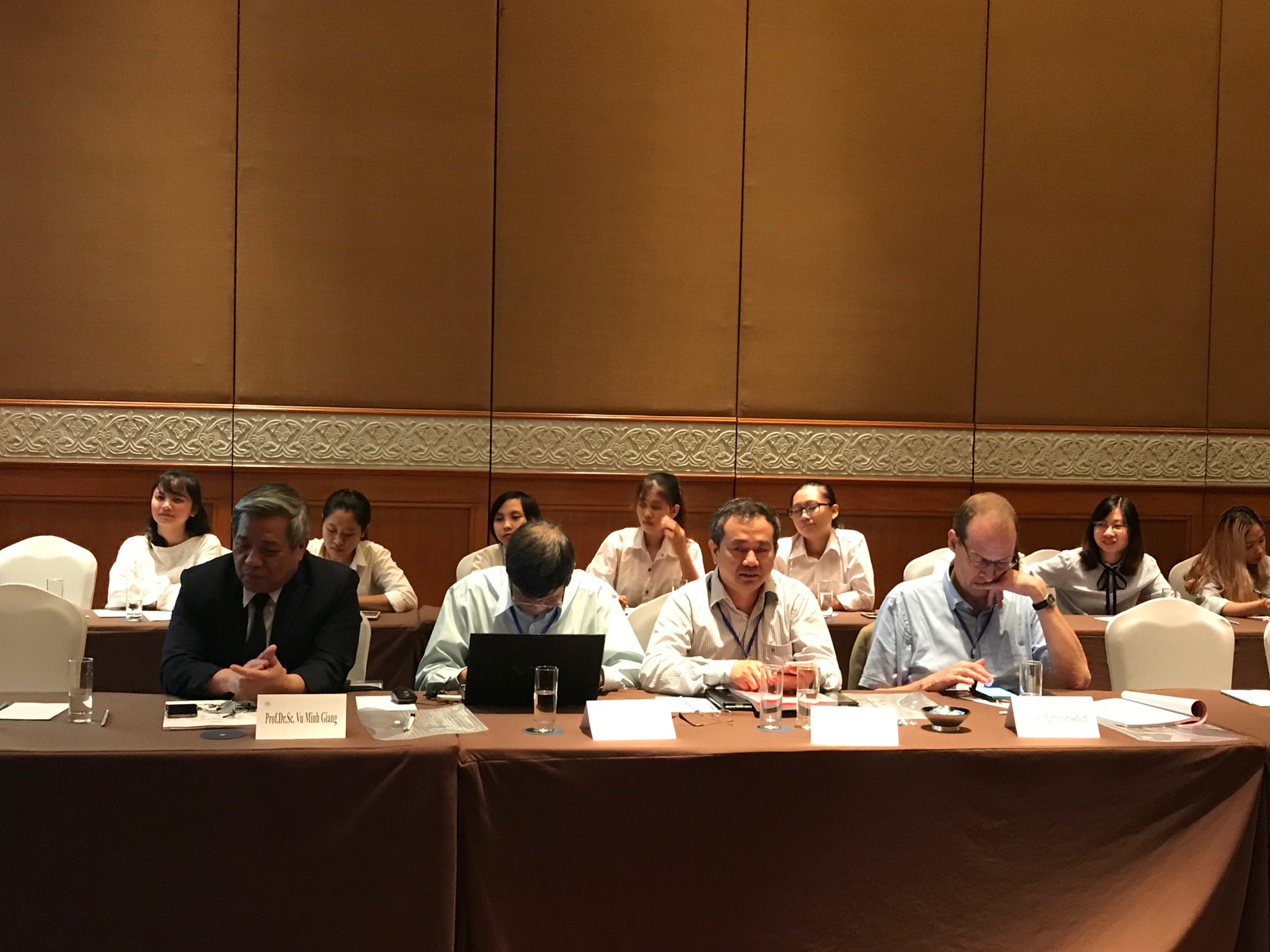
The seminar had the participation of Vietnamese and German scientists.
Referring to the teaching of World History in the general education program, Professor Tran Thi Vinh said that the structure of knowledge about world history follows the principle of "concentricity", that is, historical knowledge about the periods taught repeatedly at all 3 levels, causing boredom. According to a survey, the content about world history at the secondary school level only accounts for 12% of the total program time, which is a modest ratio compared to the world. Besides, there is no synchronic connection between world history and Vietnamese history in the textbook program. The content of knowledge about war and revolution is too much in comparison with other important contents such as economic history, culture, civilization, achievements of human science and technology, etc.
When writing the world history section in textbooks, according to Professor Tran Thi Vinh, the important thing is to rely on common world standards but must look at world history from the Vietnamese perspective, with a connection to Vietnamese history.
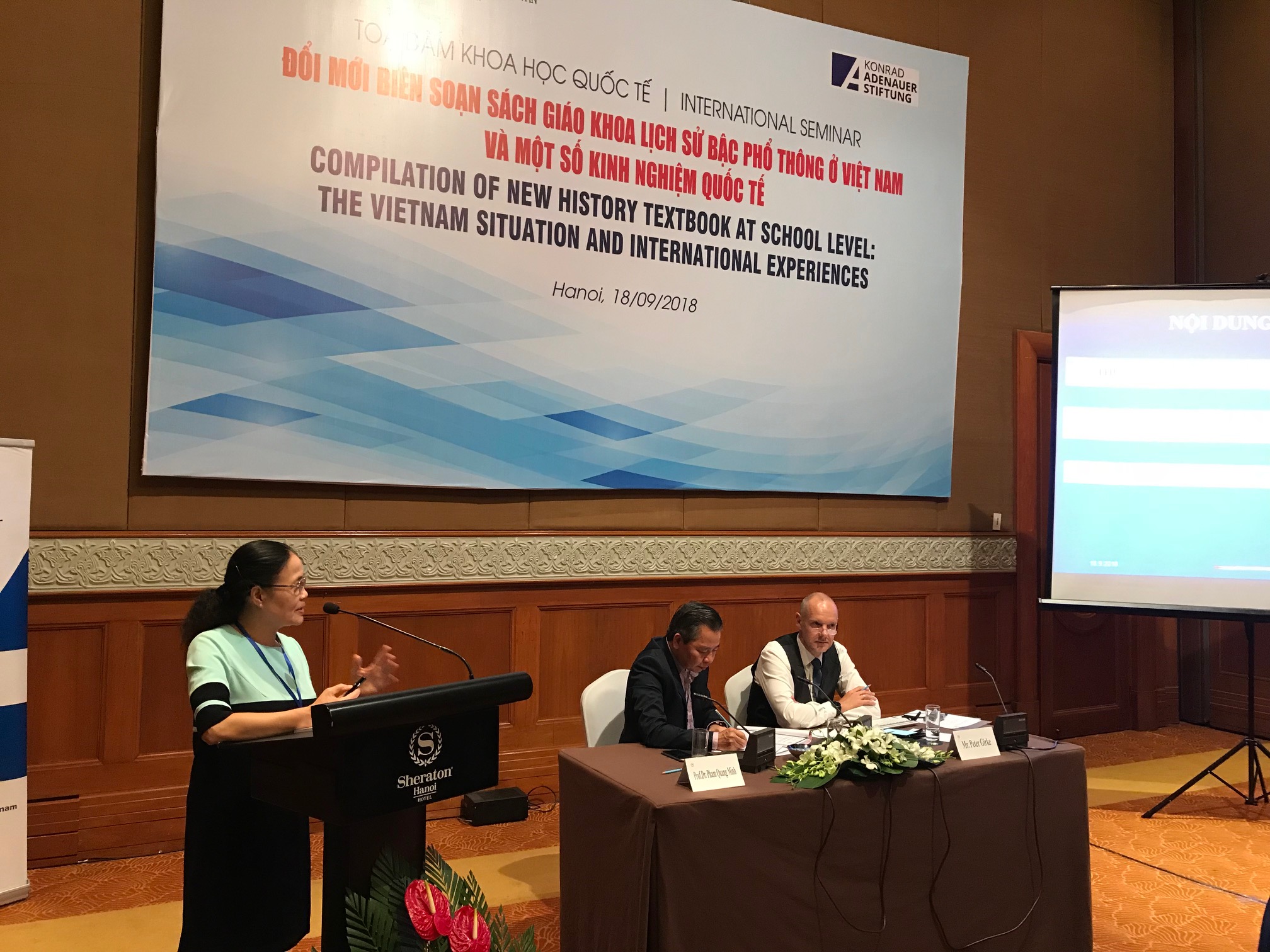
Professor Tran Thi Vinh speaks about innovation in compiling world history textbooks
Sharing experiences in compiling history textbooks in other countries, Associate Professor Dr. Ngo Minh Oanh (Faculty of History, Ho Chi Minh City University of Education) said that each country has different socio-economic conditions, education, education levels, customs and habits, so the application of foreign experiences to Vietnam needs to be carefully calculated. However, any education system needs beautiful textbooks, attractive in content and form; focusing on developing students' capacity based on various rich sources of materials and information and convincing readers with diverse sources of information. Therefore, history textbooks need to be invested in compiling to match the position and importance of this subject, so that textbooks are not a barrier to improving the quality of teaching and learning.
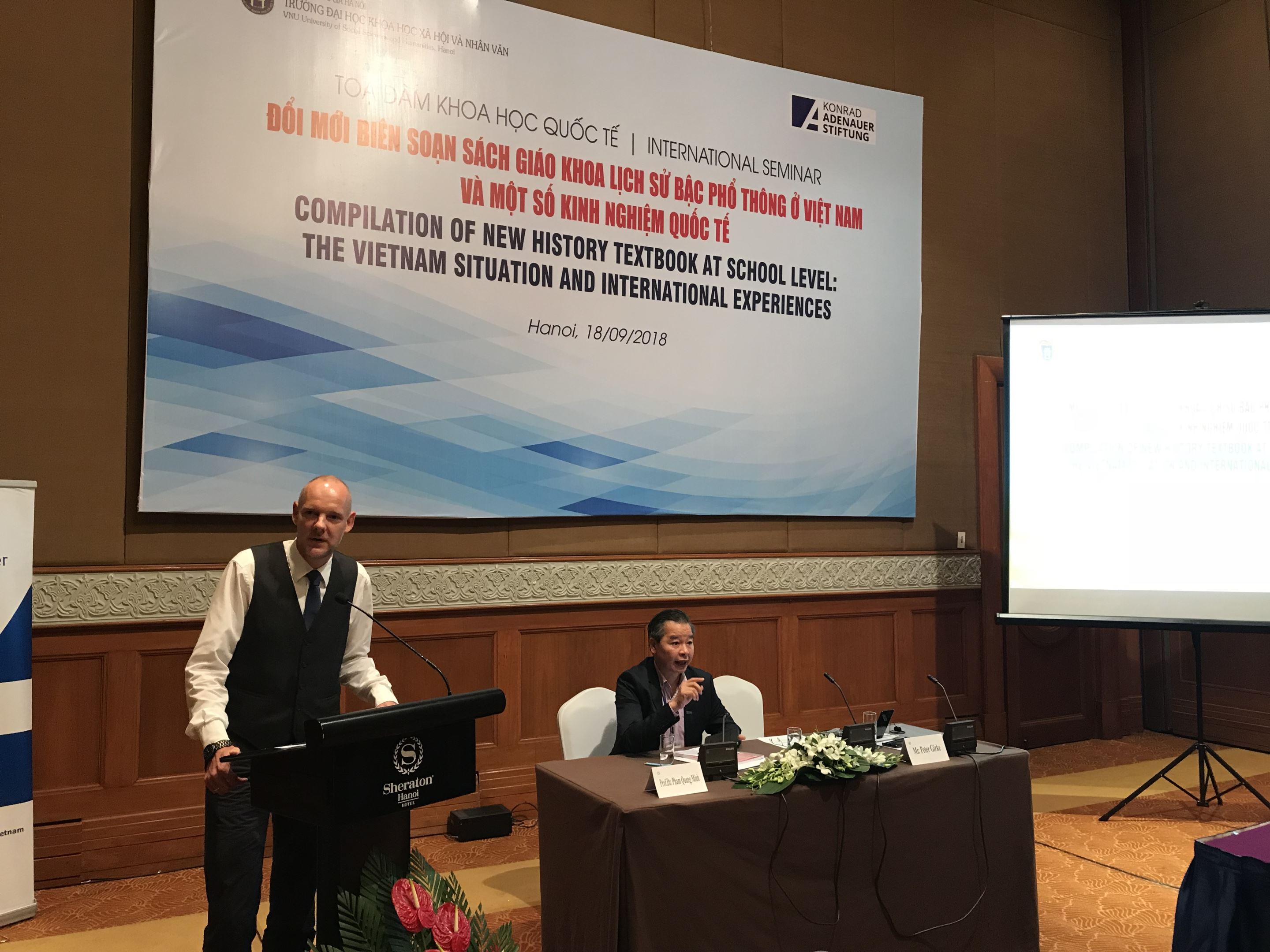
Mr. Peter Girke (Chief Representative of Konrad-Adenauer-Stiftung Foundation in Vietnam) highly appreciated the quality of the discussion and suggested building this discussion content into a cooperation project between the School and KAS Foundation.
Speaking at the closing session of the discussion, Mr. Peter Girke (Chief Representative of the Konrad-Adenauer-Stiftung Foundation in Vietnam) said that he had gained new insights into textbook compilation activities - a seemingly simple task but in reality very complicated and requiring careful consideration from many sides and acceptance of different viewpoints. Teaching history is also a path, a means to create reconciliation in history. Teaching history must aim to build independent and critical thinking. Convinced by the quality of the discussion at the discussion, Mr. Peter Girke expressed his desire to turn this discussion into a long-term research project between the School and the Konrad-Adenauer-Stiftung Foundation in the future.
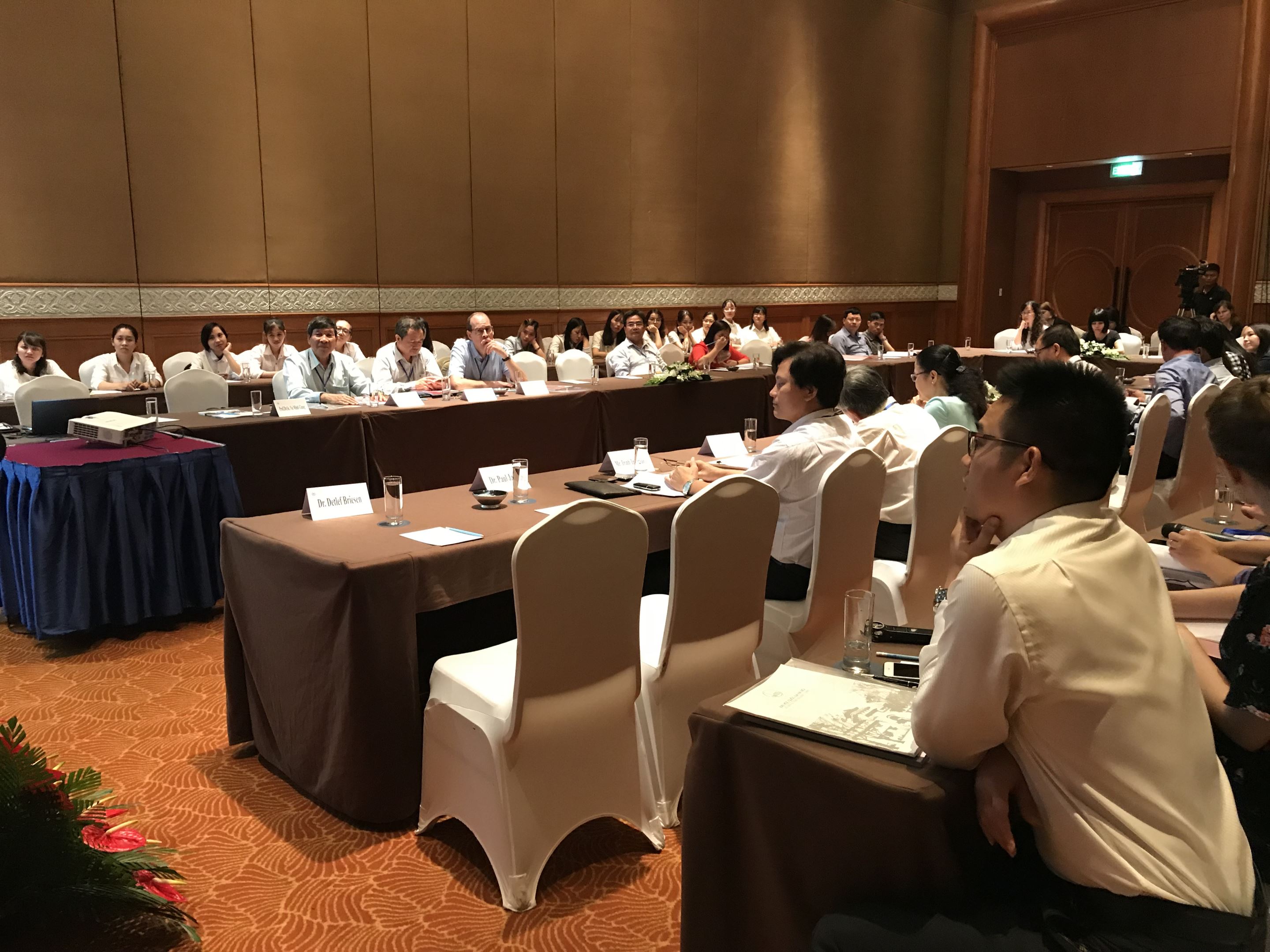
Author:Thanh Ha
Newer news
Older news